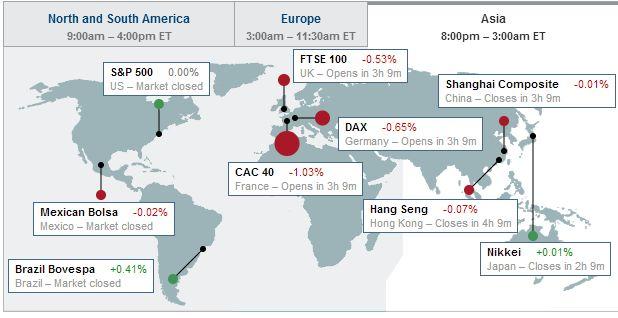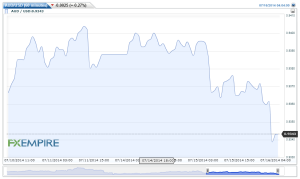Asian exchanges were lackluster this morning after China met expectations of solid but unspectacular growth in the second quarter. The world’s second-largest economy expanded 7.5 percent over a year earlier in the April-June quarter, picking up slightly from 7.4 percent growth in the first quarter, and suggesting the government’s mini-stimulus measures had helped to offset a housing slowdown. Traders were expecting the 7.5% read but were hoping for higher after the government had pushed so much stimulus into the marketplace. It took all the government’s efforts to reach the promised 7.5% which is not a good sign for the longer term.
The Nikkei 225, the benchmark for the Tokyo Stock Exchange, was little changed at 15,392.55 after the Chinese data. Hong Kong’s Hang Seng added 0.2 percent to 23,515.47 while Seoul’s KOSPI shed 0.1 percent to 2,011.75. China’s Shanghai Composite rose 0.1 percent to 2,071.97 and Australia’s S&P/ASX 200 dropped 0.1 percent to 5,505.50.
The government has been trying to boost domestic consumption to drive the economy as its longstanding engines of exports and industrial investments lose momentum. They have acknowledged that growth won’t return to the double-digit rates experienced for much of the preceding decade. Beijing responded by launching a series of mini-stimulus measures based on higher spending on construction of railways and other public works.

“In the first half of the year, economic growth was stable. Employment was stable,” said a government spokesman, Sheng Laiyun. The economy generated a relatively healthy 7.4 million new jobs in the first half, according to Sheng. The latest growth was in line with the ruling Communist Party’s 7.5 percent target for the year. Analysts say Chinese leaders are willing to accept growth below the official target so long as the economy generates enough new jobs to prevent unrest.

The US Dollar is trading in the green this morning after comments and testimony from Janet Yellen yesterday helped support the greenback, which is weighing on Asian currencies today. The dollar gained to trade at 80.047 while the Aussie gave up 28 points to trade at 0.9342 also weighed down by continued comments from RBA members that the currency is overvalued. The NZD declined by 60 points to trade at 0.8708 after domestic lackluster inflation and low dairy prices hit the wires. The New Zealand dollar tumbled on speculation a slump in dairy prices and inflation data that’s weaker than expected will give the Reserve Bank more room to pause in its interest rate tightening cycle.
In Japan the yen weakened against the strong dollar after yesterday’s Bank of Japan decision to hold rates and stimulus. The JPY is trading at 101.74 up by 7 points against the greenback while against the euro the pair added only 3 points to reach 138.00.
